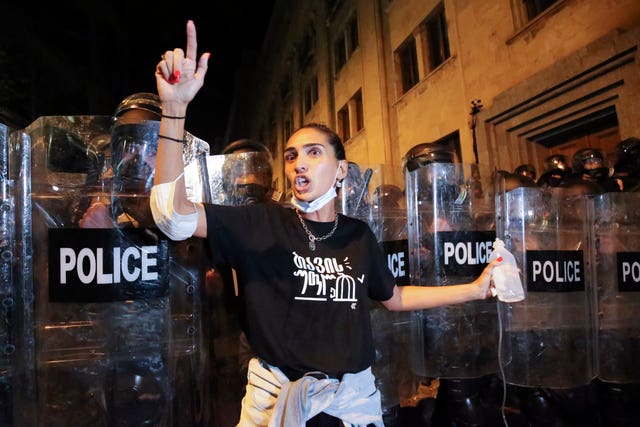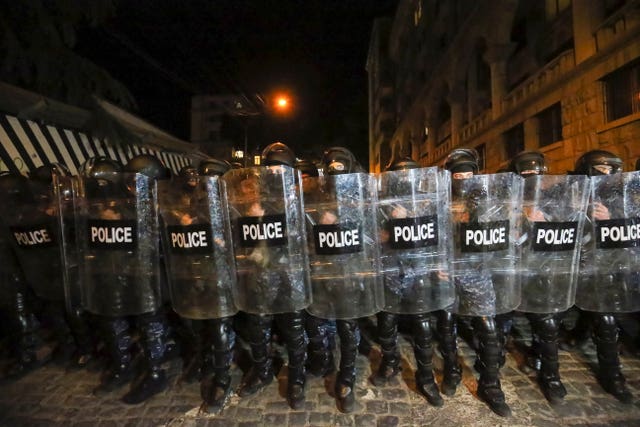Dozens of people have been arrested in Georgia, and an opposition leader was seen bandaged and bruised, after police overnight used tear gas and water cannons to disperse the latest protest outside Parliament against a Bill accused of limiting media freedom.
Georgia’s Interior Ministry said 63 people were arrested on Tuesday in the demonstration against the law that would require media and non-commercial organisations to register as “pursuing the interests of a foreign power” if they receive more than 20% of funding from abroad.
Protesters denounce it as “the Russian law” because Moscow uses similar legislation to stigmatise independent news media and organisations critical of the Kremlin.
Thousands of demonstrators had gathered to oppose the legislation they see as impediments to Georgia’s long-sought prospects of joining the European Union.
During the latest rally against the Bill late on Tuesday, police broke up the protest after demonstrators tried to block the entrances to the parliament building to prevent politicians from leaving.
Despite the protests, the parliament endorsed the Bill in the first reading earlier this month.

On Tuesday, politicians debated the Bill as part of a second reading.
The Bill is similar to the one the ruling party was pressured to withdraw last year after large street protests.
The Bill requires non-commercial organisations and news media that receive 20% or more of their funding from overseas to register as “pursuing the interests of a foreign power.”
Georgian president Salome Zourabichvili has harshly criticised the Bill and vowed to veto it if it is passed by parliament.

However, the ruling party can override the veto, and then the parliament speaker can sign it into law.
On Wednesday, Georgian TV showed Levan Khabeishvili, chairman of the pro-West United National Movement party, arriving in Parliament with bandages on his nose and forehead. Members of Mr Khabeishvili’s party said he had been assaulted by police during the protests.
Purple bruising and cuts were visible around Mr Khabeishvili’s left eye as he urged fellow MPs to scrap the bill.
“If you are not interested in how the leader of the main opposition party has been beaten up, then — for the sake of those young people who were injured, who were hit on the heads and bruised — I want to ask you once more, even though I do not have any hope, withdraw this law,” he said.
Deputy interior minister Aleksandre Darakhvelidze alleged at a briefing that Mr Khabeishvili broke through a police cordon the night before and was injured while he “resisted”.
Mr Darakhvelidze alleged that protesters and opposition leaders were “constantly committing violence”.




Comments: Our rules
We want our comments to be a lively and valuable part of our community - a place where readers can debate and engage with the most important local issues. The ability to comment on our stories is a privilege, not a right, however, and that privilege may be withdrawn if it is abused or misused.
Please report any comments that break our rules.
Read the rules hereComments are closed on this article